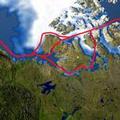 加拿大總理哈波(Stephen Harper)7月9日宣布將建造最多8艘極區等級5的北極海洋巡防艦,同時將在加拿大北極區建設一個深水港,其目的是在全球暖化造成北極海冰層覆蓋面積減少時,鞏固加拿大在北極的統轄範圍與主權。
加拿大總理哈波(Stephen Harper)7月9日宣布將建造最多8艘極區等級5的北極海洋巡防艦,同時將在加拿大北極區建設一個深水港,其目的是在全球暖化造成北極海冰層覆蓋面積減少時,鞏固加拿大在北極的統轄範圍與主權。
加拿大2006年選舉期間,哈波在其選戰政見中表示,將增加加拿大在北極區域的軍事佈局,佈署軍用破冰船,並建立遙測網絡。
哈波在拜訪溫哥華島加拿大埃斯基梅爾特(Esquimalt)軍事基地時表示:「當全球商業航海路線在加拿大北部區域開拓起來,而這塊區域石油、天然氣及其他礦物也愈來愈有價值的狀況下,加拿大北部的資源發展對這個國家就越具關鍵角色。」
為此,哈波正進行加強加拿大北美西北航道(Northwest Passage)區域主權的立法工作。這條航道連接大西洋及太平洋,過去美國及其他國家將之視為國際海峽,任何船隻都可以自由通行。
加拿大在北極區爭取統轄權已經不是新聞了,但是加拿大極區氣候變遷及暖化,使得他們更積極行動。一些預測顯示,15年後,美洲西北航道在夏季大多數時間將可以通行無阻。
北極氣溫在過去50年間已經上升了3-4℃,並且最近幾年的夏天覆蓋冰層面積還達到紀錄新低。許多科學家都預測這塊區域未來的少冰期的季節將會持續更長,也因此促成改善西北航道船隻通行的想法。
加拿大環境協會(Environment Canada)的科學家相信,海洋洋流的複雜性、連接陸地的大片冰層,以及加拿大群島(Canadian Archipelago)冰層狀況的年極端變化,將使西北航道冰層的融化現象比其他北極海域來得緩慢。該協會指出,加拿大群島冰層消減的狀況將可能增加該區域石油及天然氣探取作業,同時也使旅客更容易到達該區域。
Prime Minister Stephen Harper Monday announced the construction of up to eight Polar Class 5 Arctic Offshore Patrol Ships and the establishment of a deep water port in the far North. Harper is acting to strengthen Canada's sovereignty claims in the Arctic as global warming reduces sea ice cover.
During the 2006 election race, Harper campaigned on plans to increase Canada's military presence in the Arctic, deploy military icebreakers there and install a remote sensing network.
"More and more, as global commerce routes chart a path to Canada’s North and as the oil, gas and minerals of this frontier become more valuable, northern resource development will grow ever more critical to our country," Harper said during a visit to Canadian Forces Base Esquimalt on Vancouver Island.
Harper is moving to sharpen Canada's claim to jurisdiction over the waters of the Northwest Passage - a sea route connecting the Atlantic and Pacific Oceans - which the United States and some other countries see as an international strait that any ship should be free to transit.
The issue of Canadian sovereignty in the Arctic is not new, but climate change and the warming of the Canadian Arctic has pushed it forward.
There are predictions that the Northwest Passage may be open for large parts of the summer in as few as 15 years.
Arctic temperatures have risen three to four degrees Celsius over the past 50 years and recent summers have seen record minimum amounts of sea ice. Many scientists are now predicting progressively longer seasons of reduced sea ice cover, leading to improved ship access through the Northwest Passage.
Environment Canada scientists believe that the complexity of ocean currents, the presence of large areas of ice attached to the land and the extreme year-to-year variability of ice conditions in the Canadian Archipelago will almost certainly cause the passage to lag behind other parts of the melting Arctic ocean.
Reduced sea ice in the Archipelago is likely to allow for the increased extraction of oil and gas and make the region more accessible for tourism, says Environment Canada.
全文及圖片詳見 ENS



